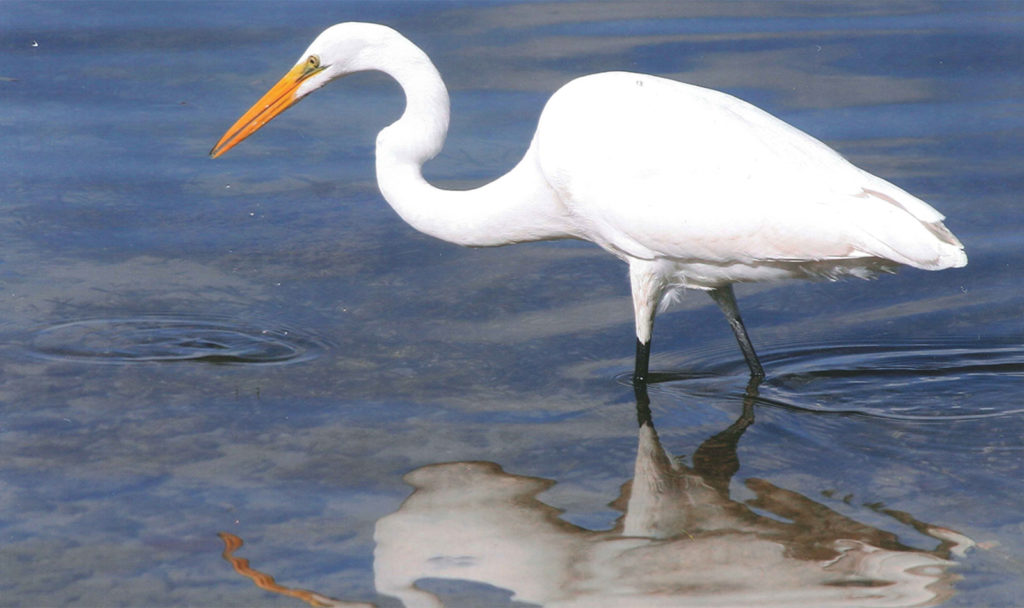Ultra: New Wildlife Worries, Lawsuit, as Traffic Plan Rejected
Tony WintonMarch 11, 2019

An egret wades in shallow waters near Virginia Key in 2016. This image was part of a project involving students at the Key Biscayne Presbyterian School. Guillermo Gentz/Key Biscayne Citizen Scientist Project
BREAKING NEWS UPDATE: Mar. 12 – A Miami judge set a Friday hearing on an injunction request by The Brickell Homeowners Association against City of Miami’s deal with Ultra Music Festival. The request to declare the city’s agreement “null and void” will be heard by Circuit Court Judge Rodolfo Ruiz. The Association contends the City did not follow competitive bidding requirements in granting Ultra permission to hold a concert on Virginia Key
With three weeks to go before the Ultra Music Festival, some environmental groups say they’re worried too little is being done to protect land and marine life from the 60,000 concertgoers expected daily on Virginia Key March 29-31. That’s on top of continued uncertainty about a multi-agency traffic plan and now a new lawsuit against the City of Miami challenging the way the concert was approved. Also this week, the Uber ride-hailing service said it was considering banning after-concert pickups at Ultra, citing passenger and driver safety concerns.
ENVIRONMENT
Ultra submitted a 144-page environmental “remediation plan” covering pollution, noise and wildlife concerns. It proposes using 19-foot-high shipping containers to create “sound curtains” near the University of Miami’s fish hatchery as well as acoustical reflectors near the main Virginia Key stages to minimize sound radiation from the ear-splitting music the concert is known for. Sound levels will be kept to 110 decibels at 60 feet from the stages. Barriers will keep attendees from sensitive areas, and marine patrols will monitor activity in the Marine Stadium basin. The plan, developed by Australia-based infrastructure firm Cardno, is now before City officials, but it’s unclear whether the City will ask for changes or how the plan is being implemented. Sharon Niemczyk, the report’s author, said she was not authorized to comment without approval from Ultra.
Some environmentalists are skeptical.
“We are extremely concerned that noise and pyrotechnics and lights will be extremely disruptive” to wildlife, said Rachel Silverstein, executive director of Miami Waterkeeper. Silverstein disputed the report’s contention that animals could simply “retreat” to adjacent habitats. “You’re not allowed to harass an animal to the point where it leaves,” she said. “You can’t go into an area, play really loud music, have them all flee, and then say ‘they all left, so we didn’t harm them.’”
“It’s uncharted territory about the impact to the environment,” said Leah Kinnard, a co-founder of the Virginia Key Alliance.
“We really don’t know,” she said.
TRAFFIC
Meanwhile, City and Miami-Dade County officials continue to struggle to set an overall traffic plan. On March 7, the County formally rejected Ultra’s proposed “Maintenance of Traffic” plan. Ultra’s submission was missing schematics for pedestrians and fencing on the Rickenbacker Causeway median, according to County Transportation and Public Works spokeswoman Karla Damian. Damian said while Ultra can make corrections and resubmit, the overall traffic approval process requires several additional approvals including the department’s highway and bridge divisions as well as the County Parks Department.
UBER
In another development, the Uber ride-hailing company is thinking about limiting its service at Ultra to concert drop-offs only, said spokesman Javier Correoso.
“There are very big safety concerns, and the safety of our riders and driver partners is top in mind,” Correoso said.
Uber and rival ride service Lyft are working together with safety agencies as the event nears. Correoso said the two companies project 3,000 to 4,000 vehicles would be needed to meet pickup demand, raising safety concerns should drivers try to meet riders on the crowded, dark causeway. Uber expects to make a decision on banning pickups next week, but Correoso stressed Uber intends to still let people book drop-offs to the event.
LAWSUIT
Still another unknown involves a new lawsuit filed by the Brickell Homeowners Association against the City of Miami. The suit contends City officials violated bidding requirements in reaching a $2 million deal for the Virginia Key location. The Association, which opposed the relocation of the concert from Bayfront Park to Virginia Key, is asking a court to declare the City must comply with the competitive bidding process spelled out in Miami’s City Charter for any lease of City-owned property.
Attorney David Winker said he will ask for an emergency hearing before Miami-Dade Circuit Court Judge Rodolfo Ruiz this week.
“We will ask the judge to declare the license agreement null and void,” he said.
In a statement, Miami City Attorney Victoria Mendez said she was reviewing the complaint and her office “will defend the City’s interest.”


